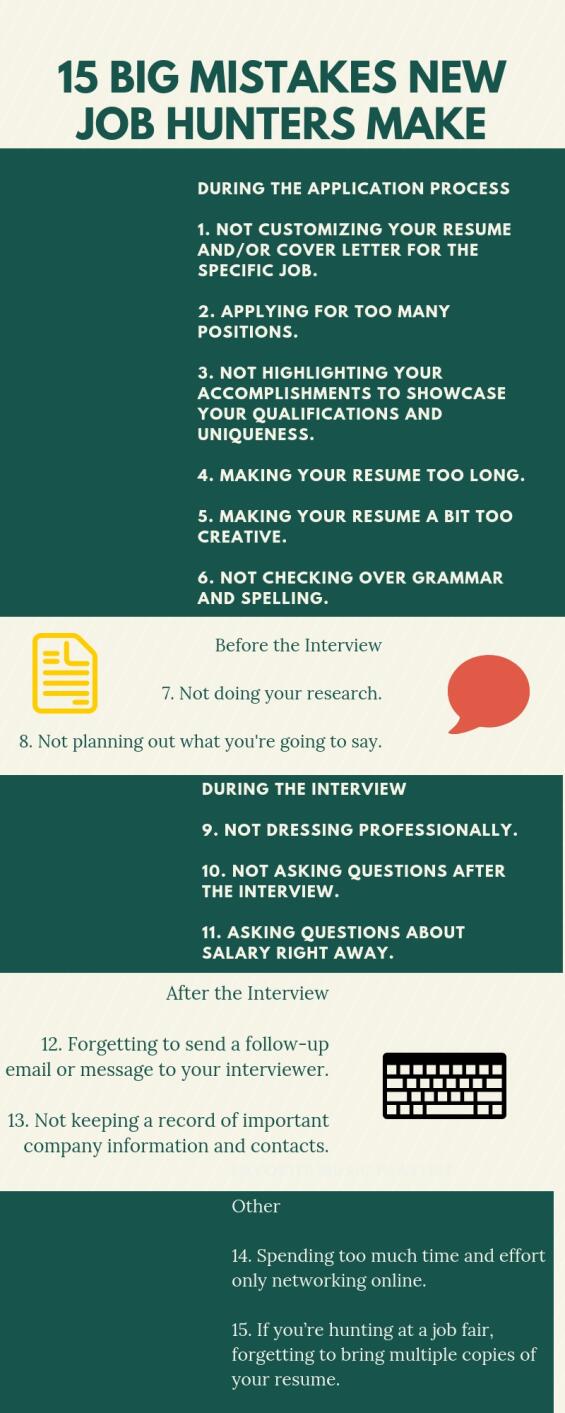By Kailey Walters
Uloop, December 18, 2018 —
Searching for a job can certainly be a daunting task at times. With so many different options, not to mention tedious steps involved in the job application process, we’re all bound to make mistakes every once in a while — mistakes that we want to do our best to avoid so that we can increase our chances of securing that job we want.
To get the most out of your job hunt and avoid making any needless mistakes, read on for some common things you should stop yourself from doing while searching for your next job.

During the Application Process
1. Not customizing your resume and/or cover letter for the specific job.
Considering you’ll most likely be applying to a number of different jobs, it’s important that you tailor your resume and cover letter to each specific position. No company wants to receive generic, somewhat bland application materials that could be submitted for many other similar positions out there.
To make yourself stand out in your applications, put in the necessary time and effort to present something a little different for each position. After all, not every position is going to be exactly the same — even if they have similar job descriptions and requirements (which is quite likely), they are still bound to be different in significant ways. For one thing, the positions will be for different companies, which means your resume and cover letter should reflect in some way what you expect from that particular company’s culture and environment. For another thing, each position itself will be slightly different in some way, which gives you room to write about why you would be a good fit for that particular job based on its specific responsibilities and qualifications.
No matter what, you should definitely make your resume and cover letter stand out as much as possible to each company you apply to by tailoring your application materials. Even though one company won’t necessarily know if you’ve submitted the same resume and cover letter to every other place you applied to, the hiring manager will most likely be able to tell that your writing is fresh and unique to this particular position. Of course, the process of customizing your resume and cover letter can be a bit time-consuming and tedious, but just keep in mind that putting in that extra effort and time can make a huge difference.
2. Applying for too many positions.
Understandably, you’ll want to apply to a large number of different jobs to give yourself the best chance of getting accepted as possible. However, you should take caution with this, as you don’t want to burn yourself out or waste your time applying to jobs that you might not even want or feel qualified for.
Instead, take some time to sit down and figure out what you want in a job. Of course, it’s always good to be open-minded and have enough options to choose from, but on the flip side, you want to be careful about overwhelming yourself. Keep in mind the saying, “Quality over quantity,” when making decisions about what types of jobs you apply to.
3. Not highlighting your accomplishments to showcase your qualifications and uniqueness.
When putting together your resume and cover letter, it’s important to think about what exactly you’re going to say. Aside from the standard information describing your past relevant work experience and skills, it may be beneficial to include some information that emphasize your accomplishments and qualifications. Doing so will allow you to display to the hiring manager how you stand out from the rest of the other applicants, by highlighting what you specifically can bring to the table.

Getty Images
4. Making your resume too long.
While you understandably may want to list out everything that you think is relevant to the position you’re applying to, you should also be cautious of making your resume too long. Hiring managers who are going through hundreds of resumes a day don’t want to see a resume that’s longer than they expect — so if they come across a resume that’s more than a page long, there’s a good chance they’ll toss it aside without giving it much consideration.
To that end, make it a priority to keep your resume concise enough that it fits all on one page. Keeping to this rule will not only make hiring managers happy, but it will also help you narrow down the most relevant things on your resume so that you can pinpoint what is most important.
5. Making your resume a bit too creative.
Even if you have the urge to make your resume stand out in a very different (i.e. creative) way, it’s most likely best to avoid doing so. You don’t want to come across as being too flashy by using bright colors or nonstandard format; instead, play it safe by sticking to a traditional, professional style of resume.
6. Not checking over grammar and spelling.
While this may seem like a minor thing to worry about, making sure your resume and cover letter (and any of your other application materials) have correct grammar and spelling is extremely important. Using poor grammar can leave a bad impression on the hiring manager, who might get the idea that you’re a weak candidate because you can’t communicate effectively or even bother to look over your own writing. With that being said, make sure you take the time — even if it’s just a few minutes — to check your grammar and spelling!

Infographic by Kailey Walters
Before the Interview
7. Not doing your research.
If you’ve managed to secure an interview at this stage, congratulations! You’re moving on to the next step. That doesn’t mean you can just sit back and relax, however — now it’s time to do your research on the company you’ll be interviewing with.
Take the time to find out more about the company and the position you’ve applied to — what the work culture and environment are like, the company’s core values, major achievements that the company has been recognized for in the distant and recent past, etc. While not all of the information may be immediately necessary, it definitely looks better if you know more about the company itself and how it operates.
8. Not planning out what you’re going to say.
Inevitably, you’ll have to think sooner or later about what you’re going to say during the interview. Of course, you won’t know the exact questions the interviewer will ask beforehand, but you can certainly take steps to ensure that you’ll be as ready as you possibly can be.
Sometimes it can be as simple as searching online for common interview questions. While different kinds of questions tend to be asked depending on the position, many interview questions are often very similar, which gives you the opportunity to practice ahead of time. For example, you may want to start out with some fairly standard interview questions such as, “Tell me about yourself,” or “What can you offer to this position/company?”
It may also be a good idea to gear yourself up for some not-so-standard interview questions as well. While you won’t be able to predict what kinds of questions these will be, bracing yourself and keeping an open mind will prepare you to answer unexpected questions with relatively more ease than if you stuck with a strictly rehearsed script.
During the Interview
9. Not dressing professionally.
Presenting yourself professionally is a huge part of making a good impression during your interview. It’s a smart idea to base your outfit on both the job position and the culture of the company itself — although when in doubt, always go a little more overdressed than underdressed. When you are overdressed, at least you are showing that you care about your professional image and want to leave a good impression on those around you.
10. Not asking questions after the interview.
After every interview, the interviewer usually provides the opportunity for the candidate to ask questions. Many people who are perhaps not accustomed to this interview style may take this as a sign that the interview is over and they are no longer required to say anything. However, that is not the case — instead, it is a time for candidates to show how curious and invested they are in the position and in the company. Ultimately, asking the right kinds of questions leaves a good impression on the interviewer.
Speaking of the right kinds of questions …
11. Asking questions about salary right away.
One question you definitely don’t want to start your interview off with — or maybe not even mention at all — is a question about salary. Both you and the interviewer may even be thinking about it, but it’s certainly better to be on the safe side and not say anything about it at all. Focusing on other things about the job besides how much you’re getting paid will show that, rather than being caught up in the money aspect and coming across as somewhat greedy, you are interested in the position itself and eager to work because you are passionate about the job.
After the Interview
12. Forgetting to send a follow-up email or message to your interviewer.
Once the interview is over, you’re allowed to give yourself a little pat on the back for (hopefully) a job well done. You can’t completely stop there, however — instead, you need to make it a priority to send a follow-up email right away, preferably within a few hours of the interview being over, or perhaps a day later at most. The follow-up message can be really simple, too, in which you thank the interviewer for their time and mention that you look forward to hearing from them again soon. Remembering to take this simple yet super effective step will leave a very good impression on the interviewer, as he or she will be able to recognize your good manners and professional etiquette.
13. Not keeping a record of important company information and contacts.
Something else you should do is keep a record of all the important information involved in your job applications. What with all the jobs you’re probably applying to, there’s bound to be a lot to keep track of. That’s why you should come up with a system to keep all the important information neatly organized, so that you won’t have to scramble every time you need a specific contact name, phone number, or email address. Spreadsheets are a great way to organize large volumes of information; if you’re not so much of a technologically savvy person, jotting everything down in a notebook works just as well too.
Other
14. Spending too much time and effort only networking online.
What with professionalism moving to more online social media platforms such as LinkedIn and sometimes even Facebook in recent years, you may think that confining networking to online modes is perfectly fine and maybe even better than other forms of networking. And of course, while online networking is certainly valuable in its own right, in-person networking is perhaps even more valuable. Not only is it a more personable form of communication and connection between two people, but it also enables you to practice your social skills and get more out of the interaction.
15. If you’re hunting at a job fair, forgetting to bring multiple copies of your resume.
If you’ve decided to search for your next career at a job fair, one thing you should not forget is to bring several copies of your resume. Being armed with these multiple copies will give you the chance to hand out your resume to a greater number of recruiters and hiring managers at the job fair, which increases your odds of becoming noticed by one of them.
Ultimately, there is certainly a lot of thought, time, and effort that goes into job hunting. While it may not be easy, there are many ways you can go about streamlining the process for yourself so that it turns out to be relatively smooth and hopefully successful. Happy job hunting!











